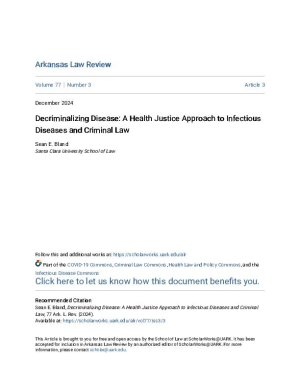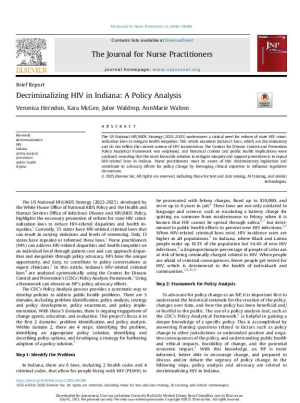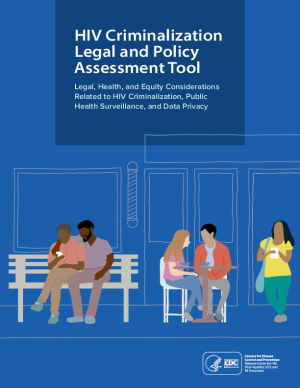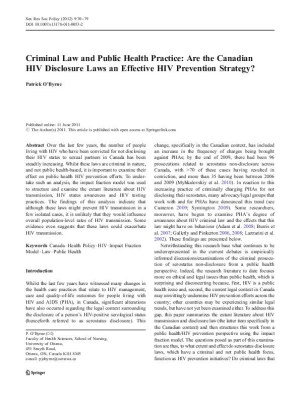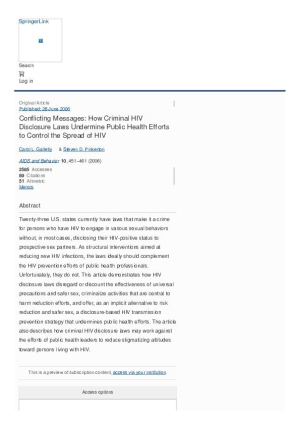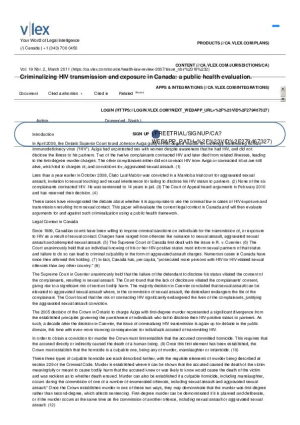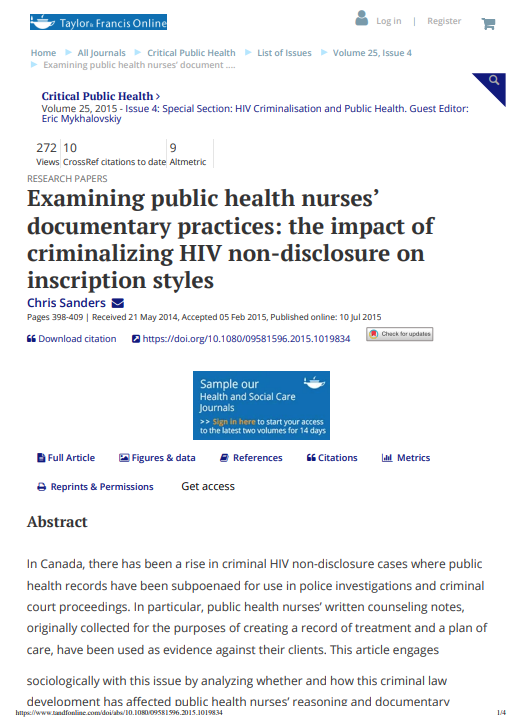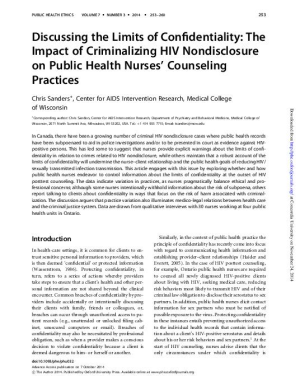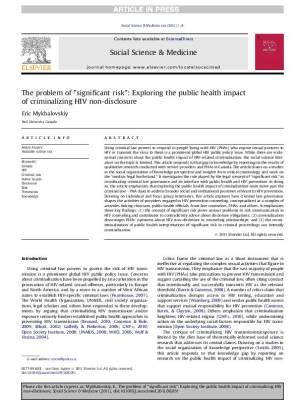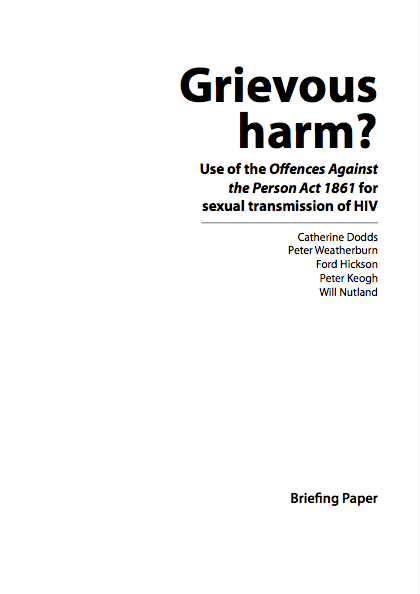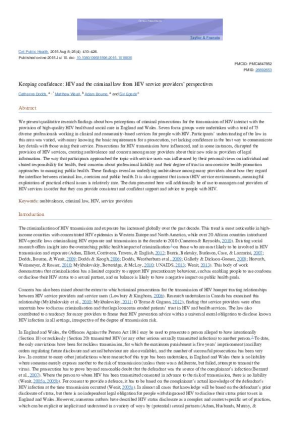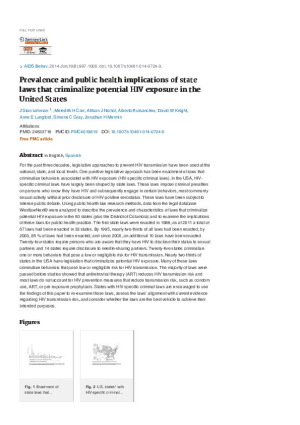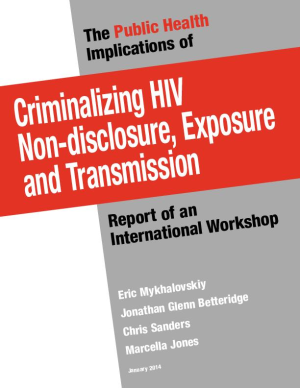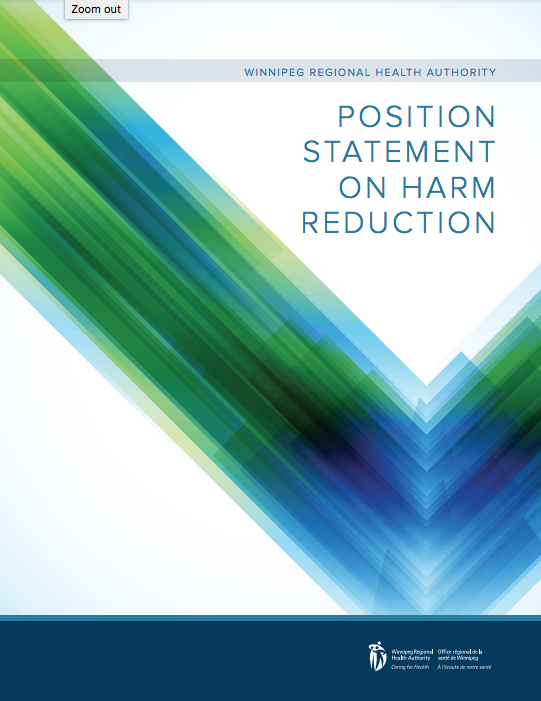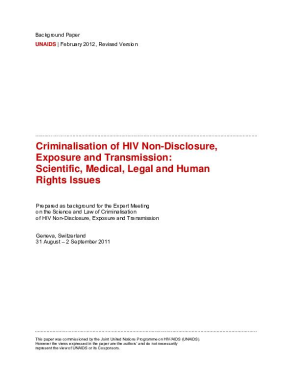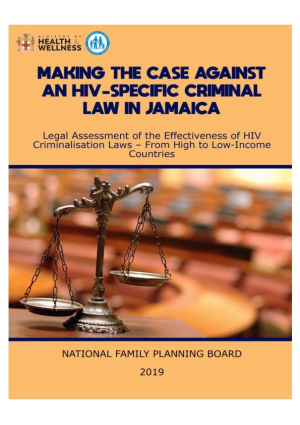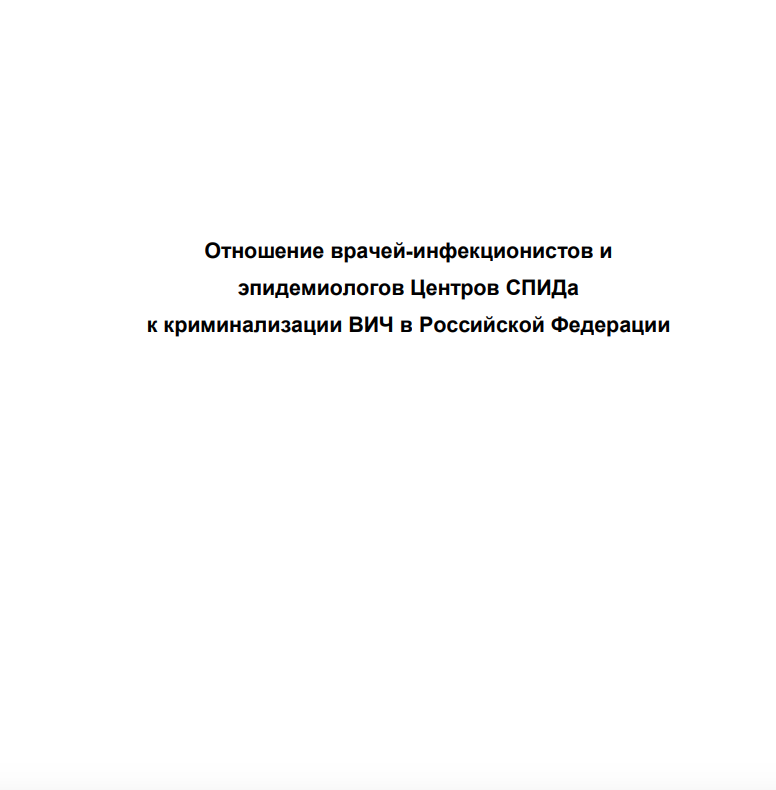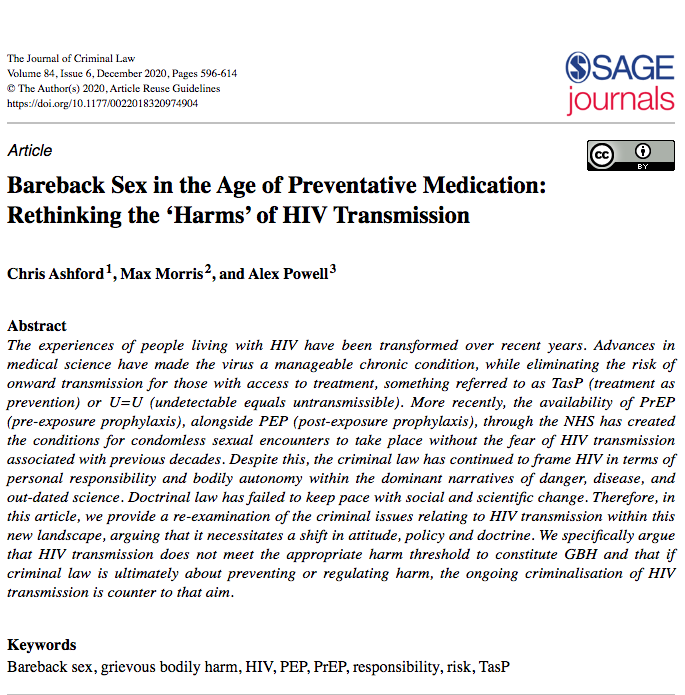This article aims to raise awareness and stimulate serious discussion of the negative impact of criminal law regulation on the prevention and treatment of infectious diseases, including HIV/AIDS, tuberculosis, and sexually transmitted diseases.
Public Health and Policy
Public health perspectives on HIV criminalisation
Decriminalizing Disease: A Health Justice Approach to Infectious Diseases and Criminal Law
This Article seeks to re-frame the discussion around the legal framework for infectious diseases in a way that moves beyond a punishment mindset and toward a health justice mindset. The focus in this Article is on health justice rather than traditional understandings of public health, defined as the science and practice of improving the health of people and their communities.
It argues that health justice, when applied to infectious diseases, requires decriminalisation. Health justice aligns with the abolitionist project to dismantle carceral practices and implement non-carceral approaches
Decriminalizing HIV in Indiana: A Policy Analysis
This article examines Indiana’s laws, which are discriminatory and do not reflect the current science of HIV transmission. The Centers for Disease Control and Prevention Policy Analytical Framework was employed, and historical context and public health implications were analyzed, revealing that the most favorable solution to mitigate inequity and support prevention is to repeal HIV-related laws in Indiana. Nurse practitioners must be aware of this discriminatory legislation and contribute to advocacy efforts for policy change by leveraging clinical expertise to influence legislative discussions.
Ending overly broad criminalisation of HIV non-disclosure, exposure and transmission: Critical scientific, medical and legal considerations
Restates UNAIDS’ position on criminalisation and makes specific recommendations to help governments, policy-makers, law enforcement officials, and civil society limit the overly broad application of criminal law to HIV.
- Alternative links
- Spanish / Español
HIV Criminalization Legal and Policy Assessment Tool
This assessment tool is designed to help individuals and organizations, including state and local health departments, to assess the extent to which a jurisdiction’s laws and regulations impede HIV surveillance, facilitate privacy breaches, or criminalize HIV infection and related risk behaviors.
The Expert Consensus Statement on the Science of HIV in the Context of Criminal Law – Five-year Impact Report: Bringing Science to Justice
In 2018, twenty leading HIV scientists published the ‘Expert Consensus Statement on the Science of HIV in the Context of Criminal Law’ (Expert Consensus Statement) to address the misuse of HIV science in punitive laws and prosecutions against people living with HIV for acts related to sexual activity, biting or spitting. The process involved undertaking detailed analysis of the best available scientific and medical research data on HIV transmission, treatment effectiveness and forensics. Building on an initial scoping report published in 2020, the HIV Justice Network (HJN) undertook further research between April and July 2023 examining the impact of the Expert Consensus Statement in cases and advocacy in the five years since its publication.
Criminal Law and Public Health Practice: Are the Canadian HIV Disclosure Laws an Effective HIV Prevention Strategy?
Considers the effect of HIV criminalisation on HIV prevention, finding that although criminal laws might prevent HIV transmission in a few isolated cases, it is unlikely they would influence overall population-level rates of HIV transmission. Some evidence suggests these laws could exacerbate HIV transmission.
Conflicting messages: How criminal HIV disclosure laws undermine public health efforts to control the spread of HIV
Demonstrates how HIV disclosure laws disregard the effectiveness of universal precautions and safer sex, while criminalizing activities that are central to harm reduction efforts. Argues that criminalization uses disclosure-based HIV transmission prevention strategy as an implicit alternative to risk reduction and safer sex, undermining public health efforts. Describes how criminal HIV disclosure laws work against public health efforts to reduce HIV stigma.
Criminalizing HIV transmission and exposure in Canada: A public health evaluation
Considers HIV non-disclosure criminal cases in Canada through a public health framework, evaluating the arguments for and against the criminalization of HIV transmission and exposure.
HIV criminal prosecutions and public health: an examination of the empirical research
Concludes that HIV-related criminal laws either fail to influence or increase STI testing avoidance, unprotected anonymous sexual contacts, and avoidance of health care because respondents do not feel safe speaking with health professionals. Suggests HIV-related criminal laws compromise public health and clinicians’ abilities to establish therapeutic relationships and to undertake HIV prevention and treatment work.
Examining public health nurses’ documentary practices: the impact of criminalizing HIV non-disclosure on inscription styles
Found that public health nurses’ anticipation that medical and public health records could be used as evidence in court is affecting public health nurses’ reasoning and documentary practices during HIV post-test counselling. Nurses have real concerns that notes will be misinterpreted and given a legal significance contrary to their original purpose, and fear their professional competence could be attacked. Traditional counselling practices prioritising client care and risk reduction are in conflict with HIV criminalisation.
Discussing the Limits of Confidentiality: The Impact of Criminalizing HIV Nondisclosure on Public Health Nurses’ Counselling
Found HIV criminalisation negatively impacts nursing practice as public health nurses endeavour to control information about the limits of confidentiality at the outset of HIV post-test counselling. Individual practice varies as nurses pragmatically balance ethical and professional concerns. Some intentionally withhold information about the risk of subpoena, while others talk to clients about confidentiality in ways that focus on the risk of harm associated with criminalisation.
HIV Criminalization: A Physician’s Perspective
US physician, Dr Wendy Armstrong’s, first person account of the prosecution of one of her patients is a rare published work about HIV criminalization by a practicing HIV medical practitioner. The article walks the reader through Dr Armstrong’s experience as she is forced to testify against a patient in HIV criminalization proceedings.
The problem of ‘significant risk’: Exploring the public health impact of criminalizing HIV non-disclosure
Emphasizes that the concept of significant risk undermines communication about transmission risk during HIV counselling and contributes to contradictory advice about disclosure obligations. Criminalization discourages openness about HIV non-disclosure in counselling relationships. The recontextualization of public health interpretations of significant risk in criminal proceedings can intensify criminalization.
Grievious harm: Use of the Offences Against the Person Act 1861 for sexual transmission of HIV
Explores use of the Offences Against the Person Act 1861 to prosecute people who have transmitted HIV infection to sexual partners in England, Wales and Northern Ireland. Examines evidence in cases of sexual HIV transmission and considers the likely impact that criminalising HIV transmission has on public health, especially HIV prevention. Includes recommendations.
Special issue on the ramifications of the current context of criminal prosecutions for non-disclosure of HIV status on nursing practice
Summarizes a full-day meeting of health providers to address nondisclosure prosecutions and nursing practice. Issues included criminal law and serostatus disclosure, public health legislation surrounding HIV care and management, civil liabilities related to HIV-related care, and professional regulations and standards that influence nursing practice. Report includes recommendations.
Keeping Confidence: HIV and the criminal law from service provider perspectives
Based on discussions with 75 service providers, this study found that criminalisation has influenced, and sometimes disrupted provision of HIV services, creating ambivalence and concern among many providers about their new role as providers of legal information. Service providers’ approach were influenced by their personal views on shared responsibility for health, concerns about professional liability and their degree of trust in non-coercive approaches to managing public health.
Prevalence and public health implications of state laws that criminalize potential HIV exposure in the United States
Describes the prevalence and characteristics of laws criminalizing HIV exposure across the U.S., examining the implications of these laws for public health practice. Finds that nearly two-thirds of states have legislation criminalizing potential HIV exposure, including behaviours that pose low or negligible risk. States are encouraged to re-examine HIV-specific laws (referencing current science) and consider whether current laws are the best vehicle to achieve their intended purposes.
The Public Health Implications of Criminalizing HIV Non-Disclosure, Exposure and Transmission: Report of an International Workshop
Explores key themes from the first international meeting focused on strengthening new empirical research on criminalization. Offers suggestions for future research on the public health implications of criminalizing HIV non-disclosure, exposure and transmission.
Position Statement on Harm Reduction
Acknowledges the harms caused by stigma and criminalisation. In particular, it acknowledges that the harms of criminalisation are borne disproportionally by Indigenous peoples in Canada. The Statement recognises that while people make their own health decisions, these decisions are only one factor influencing health outcomes.
- Alternative links
- French/Français
Criminalisation of HIV Non-Disclosure, Exposure and Transmission: Scientific, Medical, Legal and Human Rights Issues
This paper was commissioned by the UNAIDS Secretariat to serve as a background paper for the Expert Meeting on Criminalisation of HIV Non-Disclosure, Exposure and Transmission, 31 August – 2 September 2011, Geneva, Switzerland. It synthesises general considerations concerning issues raised by the application of the criminal law to non-disclosure, exposure or transmission in relation to HIV Scientific, Medical, Legal and Human Rights Issues.
Making the case against an HIV-specific law in Jamaica
This assessment ‘Legal Assessment of the Effectiveness of HIV Criminalisation Laws-from High to Low-Income Countries’ demonstrates why the enactment of an HIV-specific criminal law in Jamaica would be harmful to the national HIV response. It sets out the bases on which the recommendation for an HIV-specific criminal law should be rejected and highlights the need for public health policy considerations to centre the discussions surrounding HIV criminalisation in Jamaica.
Disability Law and HIV Criminalization
Over thirty states maintain criminal laws that expressly target people living with HIV. Thousands of people are prosecuted under these statutes, exposing them to decades of incarceration, thousands of dollars in fines, and state-sanctioned stigma. This broad pattern of discrimination based solely on HIV status is not supported by scientific evidence nor public-health rationales. This Note argues that many states’ HIV-specific criminal laws violate the Americans with Disabilities Act’s ban on discrimination by public entities.
Attitudes of infectious disease doctors and epidemiologists at AIDS centres towards the criminalization of HIV in the Russian Federation
Survey Conducted to examine the attitudes of infectious disease specialists and epidemiologists at AIDS Centres towards the criminalisation of HIV in Russia.
- Alternative links
- Russian
Bareback Sex in the Age of Preventative Medication: Rethinking the ‘Harms’ of HIV Transmission
This article provides a re-examination of the criminal issues relating to HIV transmission within the new landscape of advances in medical science and availability of PrEP and PEP, arguing that it necessitates a shift in attitude, policy and doctrine. It specifically argue that HIV transmission does not meet the appropriate harm threshold to constitute GBH and that if criminal law is ultimately about preventing or regulating harm, the ongoing criminalisation of HIV transmission is counter to that aim.
Criminalisation of HIV transmission: implications for public health in Scotland
Article analysing of the first case of HIV transmission in the UK. The authors conclude that far from protecting the public, the judgment has endorsed abrogation of individual responsibility in sexual partnerships by asserting a legal duty of disclosure on the infected partner. It is likely to undermine uptake of HIV testing and risks a one third increase in new HIV infections in Scotland. It also underlines the need for research scientists to anticipate that potentially incriminating results, even in unlabelled studies, may be followed up by forensic requests from individual study participants or by police warrant and recommends an urgent review by the Scottish Executive to minimise the negative effects on public health and molecular science.


